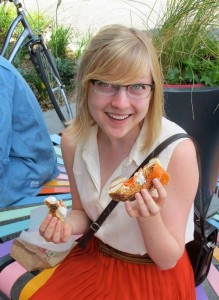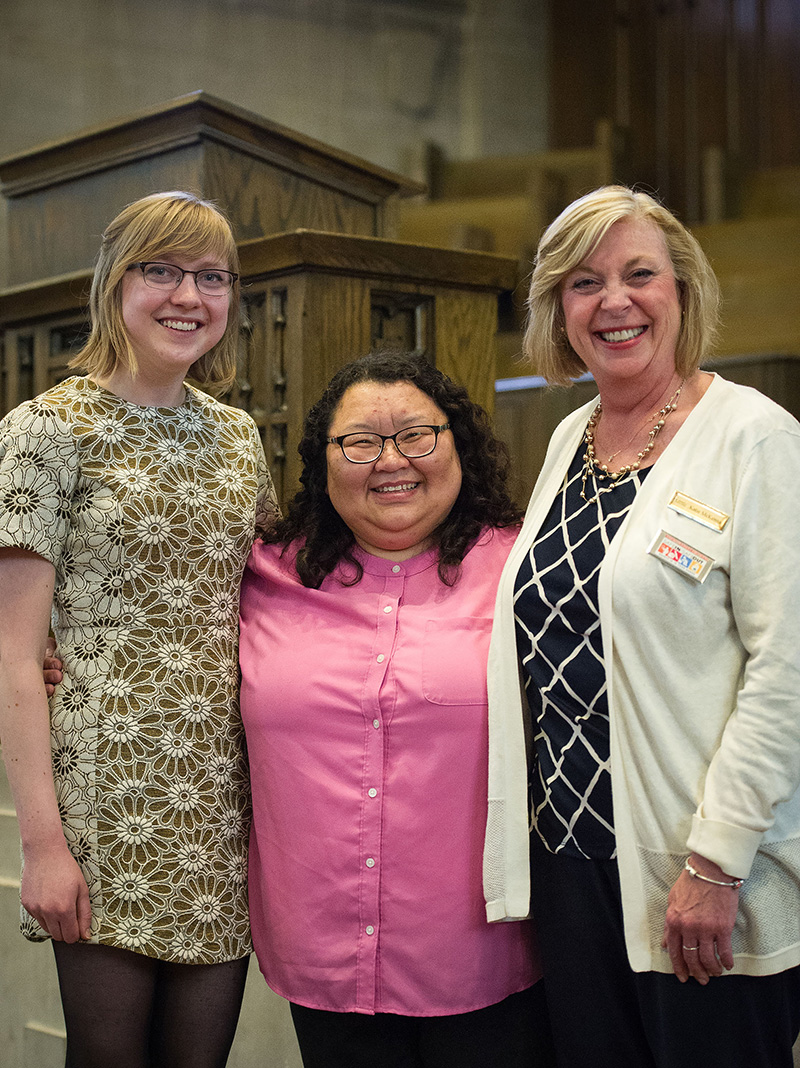Committed to Clarity: How I Became Dedicated to Reforming Our Food System
Editor’s Note: Bon Appétit has a new crop of Fellows! They’ll be introducing themselves over the next few weeks.
Until sometime late into high school, I was the model of an unconscious consumer. When I visualize my childhood diet, I see three rectangular fish sticks perfectly glued together by a melting Kraft single. My mom grew up in northern Minnesota on hamburger “hotdish” (aka casserole to the rest of the country) and ambrosia salad; my dad grew up on a cattle ranch, where his grandfather pioneered selling animal feed laced with antibiotics. We lived in the suburbs and bought frozen premade food out the back of a biweekly delivery truck. Our meals were utterly conventional — nothing organic, humane, or seasonal to speak of — aside from summer raspberries or tomatoes from the garden.

Sampling a wood-fired Montreal-style bagel
My world changed after watching the documentary Food Inc. I was floored by the commodification and dangers in our food system. But beyond the rampant waste, social injustices, health scares, environmental destruction, and alarming corporate control, perhaps the most disturbing realization for me was how hidden this world had been. How had I possibly gone through life knowing so little about something I needed to live, something I put into my body every day?
Making connections
In college, I started organizing around food issues, becoming involved with the Real Food Challenge. I became more interested in supply chains and development beyond direct-to-consumer markets, thinking about the role of large institutional buyers in food systems change. At Carleton College, I had the opportunity to meet many of the local producers who provided food for our café and learned firsthand how Bon Appétit’s purchases had grown or even saved their businesses.

With Pakou Hang, cofounder and executive director of the Hmong American Farmers Association, and Carleton General Manager Katie McKenna
Inspired, as a sophomore I helped connect Bon Appétit with the Hmong American Farmers Association (HAFA), an organization dedicated to “advancing the prosperity of Hmong farmers through cooperative endeavors, capacity building, and advocacy.” Using insights from the Real Food Calculator, chefs, and our dining manager, I and representatives from HAFA were able to identify products we were not sourcing locally that Hmong farmers could supply, from onions and sweet potatoes to bok choy and lemongrass.
All the while my motivation still came from a quest for transparency, justice, and democracy. Diet for a Small Planet author and longtime food activist Frances Moore-Lappé believes there are three societal conditions that tend to bring out the worst in us: extreme power inequality, secrecy, and blaming others. To create more sustainable and equitable systems, she argues we need to counter these ills by “dispersing power, improving transparency, and fostering mutual accountability.” As I prepared for life after Carleton, I dreamed of uncovering our food system and mobilizing people as an investigative journalist or communications specialist. That is, until Bon Appétit at Carleton’s General Manager Katie McKenna suggested I look into the Bon Appétit Fellows program.
Building bridges
The Fellowship felt like a shockingly good fit. It provided an opportunity to support student organizing, educate people about where their food comes from, and encourage greater empathy and understanding between students and Bon Appétit. It embodies Moore-Lappe’s change-making trifecta: promoting empowerment, transparency, and mutual accountability. Having been a student organizer, I know how important it is to truly understand groups — like Bon Appétit — that may be simplistically cast as adversaries. As a Fellow, I hope to help students understand the unique challenges Bon Appétit faces and the groundbreaking work it is already doing, while making sure students’ voices are heard and valued. I believe that, in all aspects of life, understanding and appreciating one another is critical to achieving our goals for a more equitable and sustainable world. One need only read the news to feel how much this is needed today.
And personally, the fellowship promises an invaluable learning experience. I love grappling with food systems’ complexity. I geek out about supply chain logistics and never shy from hard compromises: how does one humanely provide 3 million pounds of pork annually or grow a market that doesn’t yet exist? I am proud to join a company that embraces these challenges and leads the industry in socially responsible solutions. The Bon Appétit Fellowship feeds my desire to make our murky food system a little more clear, while being a part of tangible progress. I could not be more thrilled to be a new Fellow!